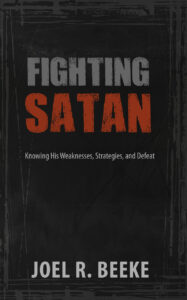
Satan is a Hebrew word that means “an accuser or adversary, one who resists.” The term is used nineteen times in the Old Testament, fourteen of which are in Job 1 and 2. Satan is also mentioned in 1 Chronicles 21:1; Psalm 109:6; and Zechariah 3:1–2.
Scholars have long disputed whether the term Satan is a proper name or a title. In Job and Zechariah, a definite article precedes the noun, so that its literal translation is “the satan” or “the accuser.” However, 1 Chronicles 21:1 and Psalm 109:6 do not include a definite article before the term. Some scholars have concluded from this that Satan should be regarded as a title in Job and Zechariah and as a proper name in 1 Chronicles and Psalm 109.1Walter A. Elwell, ed., The Evangelical Dictionary of Biblical Theology (Grand Rapids: Baker, 1998), 714.
Satan and all the other angels were created by God as spirit beings (Ps. 148:2, 5; Heb. 1:7, 14). Satan was probably one of the highest and brightest angels, who had a special place of prominence in his service to God. Ezekiel 28:12–15 tells us what Satan was like before he sinned. Though in this passage the prophet Ezekiel is pronouncing judgment on the king of Tyre, his description goes beyond the earthly king to the fall of Satan. He describes Satan as “the anointed cherub that covereth” (v. 14); “full of wisdom, and perfect in beauty” (v. 12); and morally blameless (v. 15). He was in “Eden the garden of God” (v. 13), placed “upon the holy mountain of God” (v. 14).
Donald Barnhouse writes, “Satan awoke in the first moment of his existence in the full-orbed beauty and power of his exalted position, surrounded by all the magnificence which God gave him. He saw himself as above all the hosts in power, wisdom, and beauty. Only at the throne of God itself did he see more than he himself possessed.” Barnhouse concludes that Satan, before his fall, “occupied the role of prime minister for God, ruling possibly over the universe but certainly over this world.”2Donald Grey Barnhouse, The Invisible War (Grand Rapids: Zondervan, 1965), 26–27.
Fall and Activity in Paradise
Ezekiel 28:15–19 goes on to tell us that Satan fell from his high position because of his preoccupation with his own beauty and glory and because of his foolish ambition to unseat the God of glory. Satan’s sin originated in pride, grew into self-deception, and ended in rebellious ambition. That rebellion led him to induce a large number of angels to join him in opposing God (Rev. 12:4). God then threw Satan and all the rebellious angels out of heaven to the earth (Ezek. 28:16–17). Satan lost forever his original position as the anointed cherub of God (Jude 6).
Since Satan could no longer attack God directly in heaven, he marshaled his evil efforts against man, the crown of God’s creation. Satan’s activity in history is first recorded in Genesis 3. We are told that Satan came as a serpent into Paradise, where he approached Eve. He used several techniques to tempt Eve that he still uses on us today:
- Satan put God’s command in a negative light. He asked Eve, “Yea, hath God said, Ye shall not eat of every tree of the garden?” (Gen. 3:1). God had actually stated that Adam and Eve could eat from all the trees in the garden of Eden except one. Eve corrected Satan, saying, “We may eat of the fruit of the trees of the garden: but of the fruit of the tree which is in the midst of the garden, God hath said, Ye shall not eat of it, neither shall ye touch it, lest ye die” (Gen. 3:2–3).
- Satan impugned God’s motive and character. He told Eve, “Ye shall not surely die: for God doth know that in the day ye eat thereof, then your eyes shall be opened, and ye shall be as gods” (Gen. 3:4–5). Satan sought to impugn God’s character by persuading Eve to question His goodness. God was not good and fair, he suggested, since He had restricted their freedom and forbidden their eating from the tree of the knowledge of good and evil.
- Satan said that man could be like God. Satan sought to transfer his own goal to the human race when he told Eve, “Ye shall be as gods, knowing good and evil” (Gen. 3:5). In other words, Adam and Eve could decide for themselves what was right and wrong and what they wanted to do. They did not have to listen to others, not even God. They could be their own gods. But that was a half-truth because they would know good and evil, but they could never be as God. Nor did Satan explain that without divine grace they would not have the power to do good or to avoid evil.
- Satan made sin look good. Genesis 3:6 tells us, “When the woman saw that the tree was good for food, and that it was pleasant to the eyes, and a tree to be desired to make one wise, she took of the fruit thereof, and did eat, and gave also unto her husband with her; and he did eat.”
Active, but Fully under God’s Control
Despite his success in getting Adam and Eve to disobey God, to break covenant with Him, and to plunge the entire human race into sin, Satan remained under God’s control throughout the entire Old Testament era. This is evident from Satan’s relation to Saul in 1 Samuel 16:14–23 and in Satan’s dealings with God and Job in Job 1. Satan could not act beyond the limits fixed by God in His sovereign power as the Creator. Without God’s permissive will, he “cannot so much as move.”3Heidelberg Catechism, question 28, in Reformation Heritage KJV Study Bible, 1991.
Nonetheless, Satan has regularly bruised the heel of the woman’s seed since Eden. His influence is evident in the conflict between Cain and Abel, Ishmael and Isaac, Esau and Jacob, and Egypt and Israel. Satan’s goal is always the same: to wipe out the chosen seed. Witness the command of Pharaoh to destroy all of Israel’s male children. Witness Egypt’s attack on the Israelites at the Red Sea. Witness Haman’s plot against Esther and her people.
Satan lurks at every turn throughout the Old Testament, trying to overthrow the long-term purposes of God. He incited David to number the people (1 Chron. 21:1); accused Joshua the high priest of sin (Zech. 3:1); and tried to impoverish God’s chosen people through heathen practices associated with orgiastic rites (1 Kings 18:28), witchcraft (2 Kings 9:22), occultism (2 Kings 21:6–7), and soothsaying (Micah 5:12). But Satan’s evil campaigns, no matter how well planned, continually fail, for God uses them to fulfill rather than to thwart His purposes. Satan questioned Job’s piety by saying it was based on self-interest, but in the end, God refined his servant Job through fiery trials and brought him forth as gold. Satan planned to get Balaam to curse Israel, but the Spirit of God came upon Balaam so that he prophesied instead about God’s gracious will for Israel. Satan is so ruled by God’s bidding, Calvin said, “as to be compelled to render Him service.”4John Calvin, The Institutes of the Christian Religion, ed. John T. McNeill, trans. Ford Lewis Battles (Philadelphia: Westminster Press, 1967), 1.14.17.
What a comfort it is to know that our greatest enemy’s evil schemes are fully under the control of our best Friend, so “we know that all things work together for good to them that love God, to them who are the called according to his purpose” (Rom. 8:28). That is why Calvin could conclude, “Even the devil can sometimes act as a doctor for us.”5John Calvin, Sermons on Galatians, trans. Kathy Childress (Edinburgh: Banner of Truth, 1997), 407.
Excerpt from
Fighting Satan: Knowing His Weaknesses, Strategies, and Defeat
By Joel Beeke










